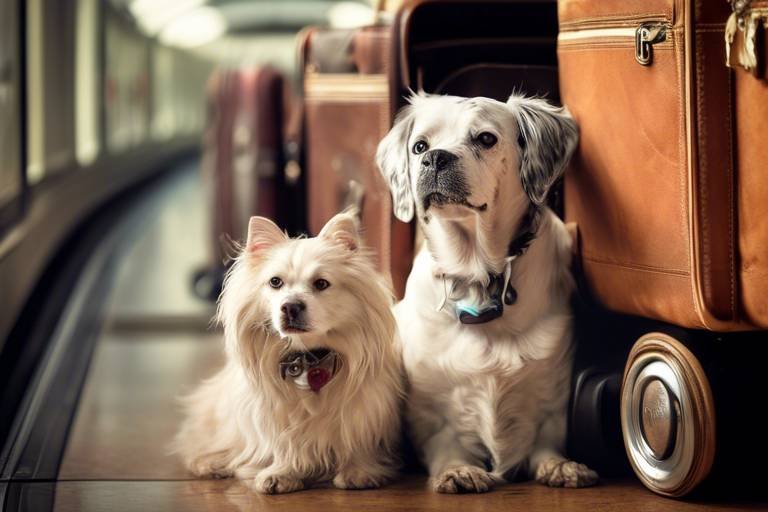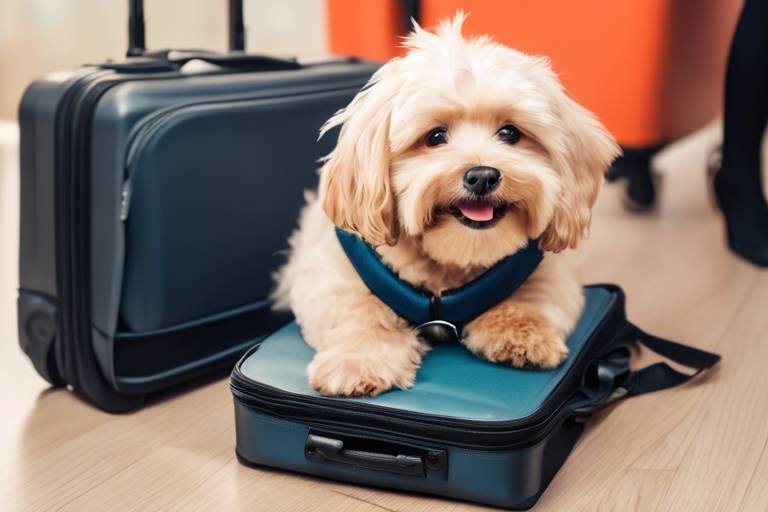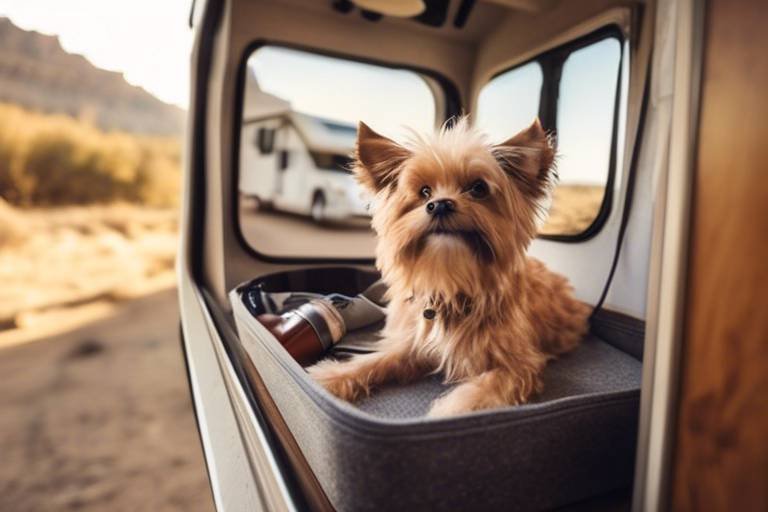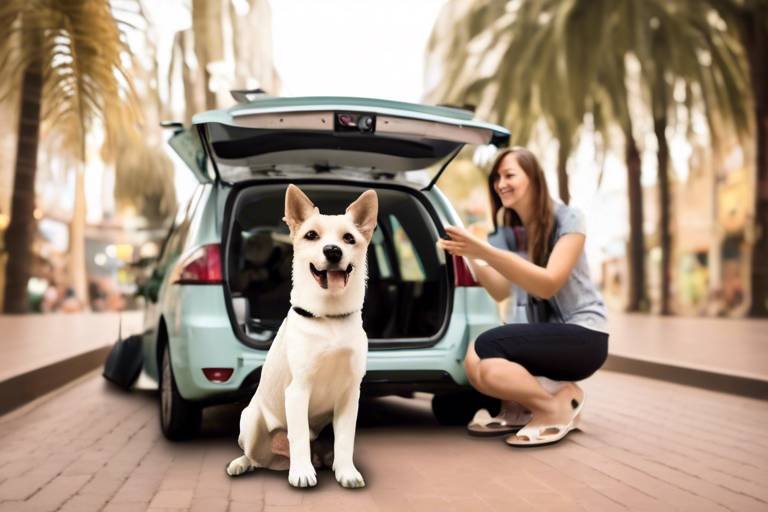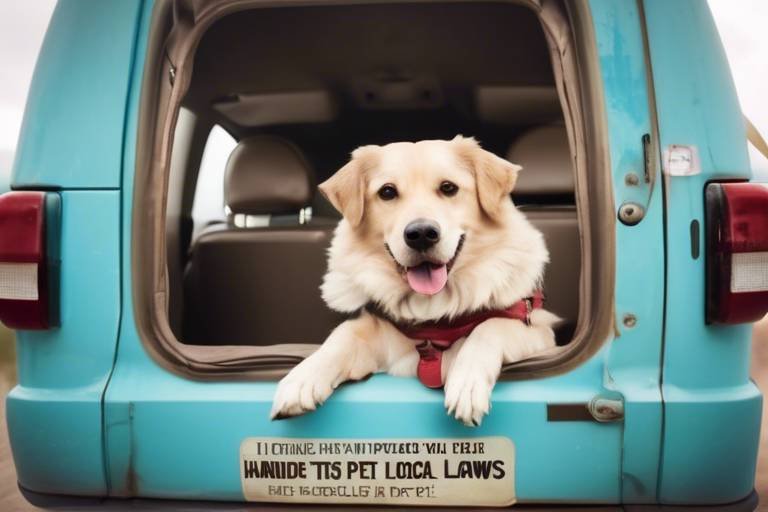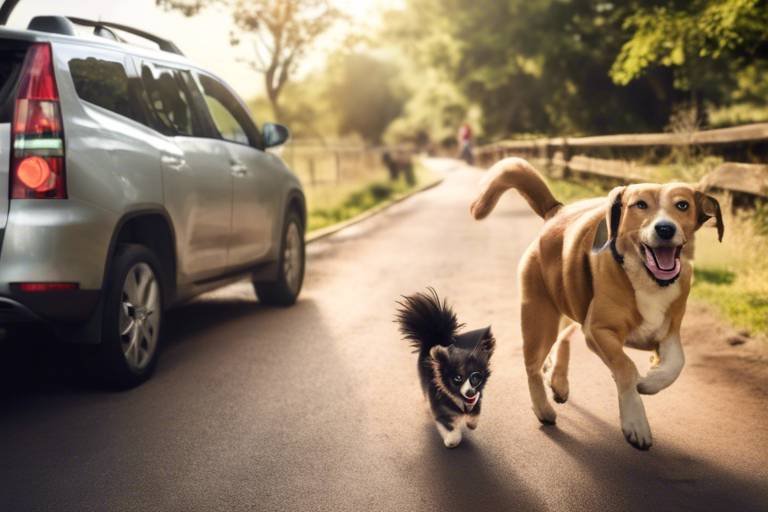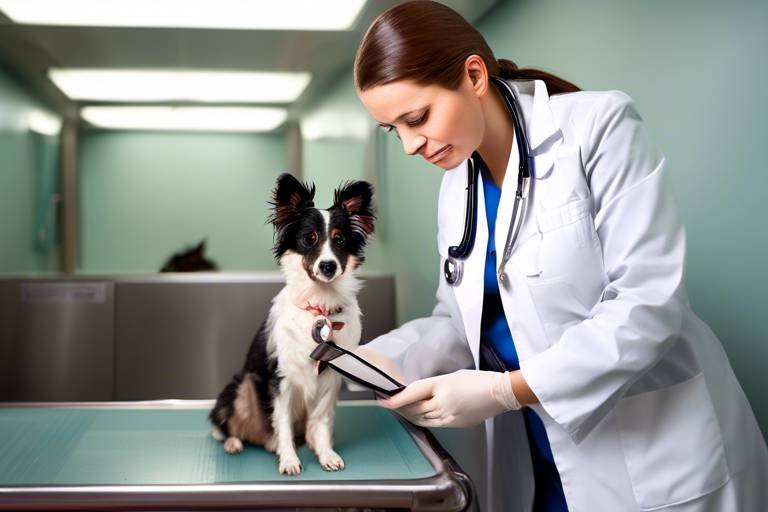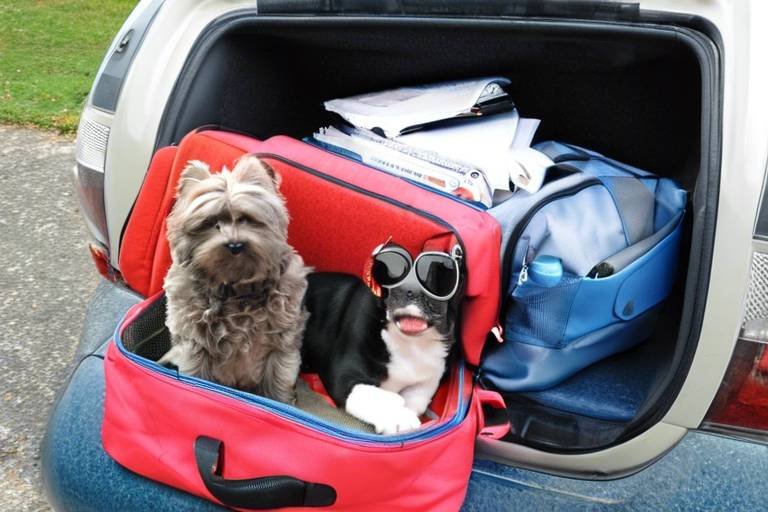Traveling with Senior Pets - Special Considerations
Traveling with our furry companions can be one of the most rewarding experiences, but when it comes to senior pets, the journey can present unique challenges. As our beloved pets age, they may require special attention and care, making it essential for us to adapt our travel plans accordingly. Imagine your senior pet as a wise old friend; just like we tend to need a little more comfort and understanding as we age, so do they. This article delves into the specific considerations we should keep in mind to ensure that our senior pets feel safe, comfortable, and loved during their travels.
First and foremost, it’s crucial to recognize that senior pets often have different physical and emotional needs compared to their younger counterparts. They may experience issues such as arthritis, vision impairment, or anxiety, which can make travel stressful. It's like taking a road trip with a grandparent who needs frequent breaks and a cozy blanket – the journey should be tailored to their comfort. By understanding these needs, we can create a more enjoyable travel experience for both ourselves and our senior pets.
In the following sections, we will explore various aspects of traveling with senior pets, from the necessary preparations to post-travel care. We’ll also discuss how to choose accommodations that cater to their needs, ensuring that every aspect of the journey is as smooth as possible. So, buckle up and let’s embark on this adventure together, keeping our senior pets' well-being at the forefront of our travel plans!
As pets age, their physical and emotional needs change significantly. Senior pets may require more frequent bathroom breaks, a softer place to rest, and a consistent routine to feel secure. It’s important to observe their behavior closely and make adjustments to travel plans as needed. For instance, if your furry friend seems restless or anxious, it might be time to take a break or find a quieter spot. Just like us, senior pets thrive on routine and familiarity. When we travel, we often seek out comfort food or our favorite songs to ease the journey; similarly, our pets benefit from familiar items like their favorite blanket or toy.
Additionally, senior pets may have underlying health issues that could affect their travel experience. Regular vet check-ups become even more critical as they age. Before embarking on your journey, consult with your veterinarian to address any concerns and ensure your pet is fit for travel. This proactive approach can prevent complications and provide peace of mind, allowing you to focus on creating wonderful memories together.
Preparation is key when traveling with senior pets. Just like packing for a trip requires thoughtful consideration of what you might need, preparing for your pet's travel involves a checklist of essential items and steps. Start by scheduling a health check with your vet, ensuring that your pet is up-to-date on vaccinations and has no health issues that could flare up during travel. It's also a good idea to obtain a copy of their medical records, just in case you need them while on the road.
Regular vet visits are crucial for senior pets. These check-ups can help identify any potential health issues before they become serious problems. Your vet may recommend specific vaccinations or treatments based on your pet's health status and the travel destination. Think of it as getting a tune-up for your car before a long road trip; it ensures everything runs smoothly. Remember, prevention is always better than cure!
Managing medications is vital for senior pets. If your pet is on any medication, create a travel schedule that aligns with their dosing times. Use a pill organizer and keep it in a visible spot so you won’t forget. It’s also wise to pack extra medication just in case of delays. Imagine running out of your favorite snack on a road trip; it’s best to be prepared! Keeping a list of your pet's medications, dosages, and administration times can help ensure you stay on track.
Maintaining a proper diet is essential for senior pets. Changes in routine can upset their stomachs, so try to stick to their regular diet as much as possible. Pack enough food for the trip, and consider bringing along some treats that they love. Hydration is equally important; make sure your pet has access to fresh water throughout the journey. It’s like ensuring you have enough snacks and drinks on a long drive; keeping them satisfied helps everyone enjoy the ride!
Ensuring comfort and safety is paramount when traveling with senior pets. Whether you're traveling by car, plane, or train, it’s essential to secure your pet in a comfortable carrier or seatbelt harness. Frequent stops for bathroom breaks and stretching can help prevent stiffness and discomfort. Think of it as taking a leisurely stroll during a long journey; it keeps the spirits high and the body limber. Always have a first-aid kit handy, just in case of any unexpected situations.
Finding suitable lodging is important for a pleasant travel experience. Look for pet-friendly accommodations that cater to senior pets' needs. Many hotels and motels now offer amenities designed specifically for pets, such as pet beds and easy access to outdoor areas. Before booking, check for reviews and ensure the place is truly accommodating to your senior pet's requirements. It’s like choosing a restaurant with a menu that caters to dietary restrictions; the right choice can make all the difference!
Accessibility can greatly impact senior pets. When selecting accommodations, look for features such as ramps, elevators, and easy access to outdoor areas. A hotel with stairs might be a challenge for a pet with arthritis. It’s essential to ensure that your pet can navigate their surroundings comfortably. Just as we appreciate a smooth path to walk on, our pets do too!
Being prepared for emergencies is essential. Create an emergency plan that includes locating nearby veterinary services during travel. Keep a list of local vets and their contact information handy, just in case. It’s like having a backup plan for a road trip; being prepared can save you from unnecessary stress. Additionally, ensure you have your pet's medical records, medications, and any necessary supplies easily accessible during your travels.
After the trip, senior pets may require special attention. They might be tired or stressed from the journey, so it's essential to provide them with a comfortable space to rest. Monitor their behavior closely and look for any signs of discomfort or health issues. Just like we need some time to unwind after a long trip, our pets do too. Gradually reintroduce them to their routine and ensure they have access to their favorite spots in the house.
- What should I do if my senior pet has anxiety during travel? Consider using calming products, such as pheromone sprays or anxiety wraps, and consult your vet for additional options.
- Can I bring my senior pet on a plane? Yes, but check the airline’s pet policy and ensure your pet is comfortable in a carrier that meets their requirements.
- How often should I take breaks during a road trip with my senior pet? Aim for breaks every 2-3 hours to allow your pet to stretch, hydrate, and relieve themselves.

Understanding Senior Pet Needs
As our furry companions age, their needs evolve significantly, much like how we adapt to the changes in our own bodies as we get older. Senior pets, typically defined as those over the age of seven, face a variety of physical and emotional challenges that require our attention, especially when embarking on a journey. Their once boundless energy may dwindle, and they might experience discomfort or health issues that can make travel daunting. Understanding these unique needs is essential for ensuring their comfort and safety during travel.
First and foremost, mobility can become a pressing concern. Many senior pets develop arthritis or other joint issues, making it difficult for them to jump into a car or navigate stairs. This means that when planning your travel, you should consider their mobility limitations. For instance, if you’re heading on a road trip, think about investing in a pet ramp or a comfortable, supportive harness that can help them get in and out of the vehicle with ease.
Moreover, senior pets often have heightened sensitivities. Their senses—sight, hearing, and smell—may not be as sharp as they once were. This can lead to anxiety in unfamiliar environments. To ease their stress, bring along familiar items such as their favorite blanket or toy. These comforting objects can provide a sense of security in new surroundings. Additionally, keeping their routine as consistent as possible can help mitigate anxiety. For example, try to maintain their feeding schedule and bathroom breaks to align with their usual habits.
Another critical aspect to consider is their health status. Regular vet visits are crucial for senior pets, as they help monitor chronic conditions and adjust medications as necessary. Before traveling, it’s wise to schedule a check-up to ensure your pet is fit for the journey. This is especially important if your pet has pre-existing conditions that could be exacerbated by travel stress. Remember to ask your vet for any specific advice tailored to your pet’s health needs during travel.
Lastly, don’t overlook their dietary requirements. Senior pets often have specific nutritional needs, which can change as they age. For instance, they may require a diet that is lower in calories but rich in fiber to aid digestion. When planning your trip, ensure you pack enough of their regular food to last the journey, and consider bringing along some healthy treats to reward them for being such great travel companions. Staying hydrated is also vital; always have fresh water available to keep them comfortable throughout your travels.
In summary, understanding the unique needs of senior pets is the first step in ensuring a successful travel experience. By addressing their mobility, health, emotional well-being, and dietary requirements, you can create a more enjoyable journey for both you and your beloved companion.
Preparation is key when traveling with senior pets. This section outlines essential steps to take before embarking on a journey, including health checks and packing necessary supplies.
Regular vet visits are crucial for senior pets. This subsection emphasizes the importance of health assessments and vaccinations before travel to prevent complications.
Managing medications is vital for senior pets. This part discusses tips for ensuring pets receive their medications on time while traveling.
Maintaining a proper diet is essential for senior pets. This section covers how to manage their dietary requirements during trips, including meal planning and hydration.
Ensuring comfort and safety is paramount when traveling with senior pets. This subsection offers advice on travel arrangements and how to keep pets secure.
Finding suitable lodging is important for a pleasant travel experience. This section provides tips on selecting pet-friendly accommodations that cater to senior pets' needs.
Accessibility can greatly impact senior pets. This part highlights what to look for in accommodations, such as ramps and easy access to outdoor areas.
Being prepared for emergencies is essential. This subsection discusses creating an emergency plan, including locating nearby veterinary services during travel.
After the trip, senior pets may require special attention. This section outlines post-travel care tips to help pets readjust and recover from their journey.
Q: How can I help my senior pet feel more comfortable during travel?
A: Bring familiar items like their favorite blanket or toy, and try to maintain their routine as much as possible.
Q: Should I consult a vet before traveling with my senior pet?
A: Yes, it's crucial to have a health check-up to ensure your pet is fit for travel and to discuss any specific needs they may have.
Q: What should I pack for my senior pet?
A: Pack their regular food, medications, water, a comfortable bed, and any familiar toys or blankets.

Preparing for Travel
When it comes to traveling with senior pets, preparation is key. Just like you wouldn't head off on a road trip without checking your car's oil, you shouldn't embark on a journey with your furry companion without making sure they're ready for the adventure. Senior pets often have unique needs that require a bit more attention and planning. So, what should you do before you hit the road? Let's dive into the essential steps that will help ensure a smooth and enjoyable trip for both you and your beloved pet.
First and foremost, it's crucial to schedule a health check-up with your veterinarian. This isn't just a formality; it's an opportunity to discuss any concerns you might have about your pet's health as they age. Your vet can provide valuable insights into your pet's specific needs and may recommend vaccinations or treatments to prevent potential health issues during your travels. For instance, if your pet has a history of anxiety during travel, your vet might suggest calming medications or natural remedies to help ease their nerves.
Next, you'll want to pack the essentials. Think of it as packing for a toddler—only this toddler has four legs and a tail! Make sure to include:
- Your pet's regular food and treats to avoid any digestive surprises.
- Medications, if any, along with a copy of your pet's medical records.
- A comfortable bed or blanket that smells like home to help them feel secure.
- Leash, harness, and any favorite toys to keep them entertained and engaged.
Moreover, it’s important to consider the travel method. Whether you’re driving or flying, ensuring your pet's comfort and safety is paramount. For car trips, make sure your pet has a secure spot—either in a crate or with a seatbelt harness—to prevent any dangerous distractions. If you're flying, check with the airline about their pet policies, as some may have specific requirements for traveling with pets.
One commonly overlooked aspect is the hydration. Just like us, pets need to stay hydrated, especially during travel. Bring along a portable water bowl and make frequent stops to offer them water. This not only keeps them hydrated but also gives them a chance to stretch their legs and relieve themselves. A good rule of thumb is to stop every couple of hours, depending on how your pet is handling the journey.
Lastly, consider your pet’s emotional well-being. Senior pets can be more sensitive to changes in their environment, so try to maintain a calm atmosphere. Bring their favorite blanket or toy, and talk to them soothingly during the trip to reassure them. You might even play some soft music in the background to create a soothing ambiance. Remember, your energy affects them; if you’re calm, they’re more likely to be calm as well.
In summary, preparing for travel with senior pets involves a mix of health checks, packing the right supplies, ensuring hydration, and maintaining emotional support. By taking these steps, you can help make the journey as enjoyable as the destination itself. So, are you ready to hit the road with your senior furry friend?
Health Considerations
When it comes to traveling with senior pets, one of the most crucial aspects to consider is their health. Just like us, our furry companions experience changes in their bodies as they age, which can affect their overall well-being. Before you hit the road, it's essential to schedule a comprehensive health check with your veterinarian. This visit should include a thorough examination, updated vaccinations, and discussions about any existing health conditions that may require special attention during your travels.
Regular vet visits are not just a precaution; they are a necessity for senior pets. Conditions like arthritis, heart disease, or diabetes can complicate travel plans, so understanding your pet's current health status is key. For instance, if your pet is on medication for a chronic condition, your vet can provide you with a detailed plan on how to manage their health while on the go. This includes advice on maintaining their medication schedule and recognizing any signs of distress that may arise during travel.
In addition to a vet visit, consider creating a travel health kit for your senior pet. This kit should include:
- Medications and instructions on how to administer them
- First-aid supplies, such as bandages and antiseptic
- Copies of medical records, including vaccination history and any special needs
- Comfort items, like their favorite blanket or toy, which can help reduce anxiety
Another important factor is hydration. Senior pets can easily become dehydrated, especially during long trips. Make sure to carry plenty of fresh water and offer it to them regularly. If you're traveling to a warmer climate, be extra vigilant about keeping them cool and comfortable. Look for shady spots during breaks, and never leave your pet in a parked vehicle, as temperatures can rise dangerously high in just a few minutes.
Lastly, pay attention to their dietary needs. Senior pets often have specific dietary requirements that can affect their energy levels and overall health. It's a good idea to pack their usual food to avoid any digestive issues that might arise from sudden changes in diet. If you're planning on stopping at pet-friendly restaurants or cafes, check their menus in advance to ensure they can accommodate your pet's dietary restrictions.
In summary, prioritizing your senior pet's health before and during your travels is vital. By taking the time to prepare and understand their needs, you can ensure a safer and more enjoyable journey for both of you.
Q: How often should I take my senior pet to the vet before traveling?
A: It's best to schedule a vet visit at least a month before your trip to allow time for any necessary treatments or vaccinations.
Q: What should I do if my pet has a medical emergency while traveling?
A: Always have a list of nearby veterinary clinics along your route. Familiarize yourself with their contact information and hours of operation.
Q: Can I travel with my senior pet if they have mobility issues?
A: Yes, but you may need to make special accommodations, such as using a pet stroller or ensuring that your vehicle is easy for them to enter and exit.
Q: What can I do to help my senior pet feel more comfortable during travel?
A: Bring familiar items like their favorite blanket or toys, and make frequent stops to allow them to stretch and relieve themselves.
Medication Management
Managing medications for senior pets can feel like a daunting task, especially when you're on the go. Just think about it: you’re excited about your trip, but the last thing you want is to forget Fido’s daily dose of heartworm prevention or Miss Whiskers’ arthritis medication. To keep your furry companions healthy and happy during travels, it's essential to have a solid plan in place. Here are some vital tips to help you manage your senior pet's medications effectively while on the road.
First and foremost, communication with your veterinarian is key. Before you embark on your journey, schedule a visit to discuss your travel plans. Your vet can provide you with a comprehensive list of your pet’s medications, dosages, and any special instructions. This not only helps you stay organized but also ensures that you are prepared for any potential health issues that may arise during your trip.
Next, consider creating a medication schedule. This can be as simple as a chart that outlines when and how much medication your pet needs. For example, you might have a table like this:
| Medication | Dosage | Frequency |
|---|---|---|
| Heartworm Prevention | 1 tablet | Once a month |
| Arthritis Medication | 1/2 tablet | Twice a day |
| Allergy Medication | 1 tablet | Once a day |
Having a visual reminder can help you stay on track, especially if you’re juggling multiple medications. You can even set alarms on your phone as a backup to ensure you don’t forget any doses. And remember, when traveling, it’s wise to pack extra medications just in case of delays or unexpected changes in your itinerary.
Don’t forget about storage conditions. Some medications require specific temperatures or conditions to remain effective. Be sure to keep them in their original containers with labels intact and store them in a cool, dry place. If you’re traveling by car, consider using a cooler for medications that need to be kept at a certain temperature. Always check the labels for any special instructions regarding storage.
Lastly, if your pet has any anxiety or stress related to travel, discuss this with your vet. They may suggest calming medications or natural remedies to help ease your pet’s nerves, ensuring a smoother journey for both of you. After all, a relaxed pet is more likely to stick to their medication schedule without fuss.
By taking these steps, you can ensure that your senior pet’s medication management is as seamless as possible during your travels. It’s all about being prepared and proactive, allowing you to focus on creating wonderful memories together.
- What should I do if I forget to give my pet their medication while traveling? If you miss a dose, give it as soon as you remember unless it's almost time for the next dose. In that case, skip the missed dose and continue with the regular schedule.
- Can I combine my pet's medications for easier management? Always consult with your veterinarian before combining medications, as some may interact negatively.
- What if my pet has a reaction to their medication while traveling? Be prepared by having a first-aid kit and knowing the location of the nearest veterinarian. Always keep a list of your pet’s medications and any known allergies handy.
Dietary Needs
When it comes to traveling with senior pets, are a crucial aspect that should never be overlooked. Just like us humans, our furry friends have specific nutritional requirements that change as they age. Senior pets often face challenges such as reduced metabolism, dental issues, and even food sensitivities. Therefore, maintaining a proper diet during your travels is essential for their well-being and comfort.
Before you embark on your journey, it's vital to consult with your veterinarian to discuss your pet's dietary needs. This conversation can help you determine if any adjustments are necessary, whether it’s switching to a more digestible food or ensuring they have the right balance of nutrients. For instance, senior pets may require diets that are lower in calories but higher in fiber to support digestive health. It's also important to consider any existing health conditions that may require a specialized diet, such as kidney disease or diabetes.
While on the road, sticking to your pet's regular feeding schedule can help maintain their routine, which is particularly important for senior pets who thrive on consistency. Bring along their usual food in sufficient quantities to last the trip, and consider packing it in a sealed container to keep it fresh. If your travels extend beyond a few days, research pet-friendly stores along your route where you can replenish supplies if needed.
Hydration is another key factor that can’t be ignored. Senior pets are often more susceptible to dehydration, especially during travel. Make sure to carry a portable water bowl and offer them water frequently. You might even want to mix a bit of low-sodium broth into their water to encourage them to drink more. Additionally, if your pet is on a specific diet that requires wet food, consider bringing along some canned food or pouches that are easy to serve on the go.
Lastly, it’s essential to monitor your pet’s eating habits during the trip. If you notice any changes—such as a lack of appetite or digestive upset—don’t hesitate to consult a veterinarian. Keeping a close eye on their health can help you catch any potential issues early, ensuring a smoother travel experience for both you and your beloved companion.
- What should I feed my senior pet while traveling? It's best to stick to their regular diet and bring enough food for the trip. If necessary, consult your vet for recommendations.
- How can I ensure my senior pet stays hydrated? Bring a portable water bowl and offer water frequently. Mixing low-sodium broth can help encourage them to drink.
- What if my senior pet has special dietary needs? Always consult with your veterinarian before traveling to discuss any necessary diet adjustments or special food requirements.
Comfort and Safety During Travel
Traveling with senior pets can be a rewarding experience, but ensuring their comfort and safety during the journey is of utmost importance. Just like us, our furry friends can feel stressed or uncomfortable when on the move. So, how can we make their travel experience as pleasant as possible? First and foremost, it’s essential to create a calm environment in the vehicle. This can be achieved by using a comfortable pet carrier or harness, which not only keeps them secure but also provides a sense of familiarity. Think of it as their little safe haven on wheels!
When planning your trip, consider the length of the journey. Long hours on the road can be tough on senior pets, especially those with joint issues or other health concerns. Make sure to schedule frequent breaks to allow them to stretch their legs, relieve themselves, and hydrate. During these stops, take a moment to observe how your pet is doing. Are they panting excessively? Do they seem disoriented? These could be signs of discomfort, and it’s crucial to address them promptly.
Additionally, the temperature inside your vehicle can significantly impact your pet's comfort. On hot days, ensure the air conditioning is working effectively, and avoid leaving your pet in the car unattended. Just like us, senior pets can suffer from heatstroke, which can be life-threatening. On the flip side, during colder months, make sure they are warm enough. A cozy blanket or pet sweater can make a world of difference for a chilly pup!
To further enhance their travel experience, consider bringing along their favorite toys or blankets. Familiar scents can provide a sense of security and help reduce anxiety. You might even think of it as packing a little piece of home for them. If your pet is prone to motion sickness, consult your veterinarian about possible remedies before you hit the road. After all, a happy pet makes for a happy journey!
Finally, always keep a first aid kit handy. Accidents can happen, and being prepared can make all the difference. Your kit should include items like bandages, antiseptic wipes, and any specific medications your pet may need. In addition to this, it’s wise to have a list of nearby veterinary clinics along your route in case of emergencies. You never know when you might need a helping paw!
- What should I do if my senior pet gets anxious during travel? Consider using calming aids such as anxiety wraps or pheromone sprays. It's also helpful to keep their environment familiar with toys or blankets.
- How often should I stop for my senior pet during a long trip? Aim to stop every 2-3 hours to allow them to stretch, hydrate, and relieve themselves.
- Is it safe to travel with a senior pet in a carrier? Yes, using a well-ventilated and comfortable carrier is recommended to ensure their safety and prevent distractions while driving.
- What should I include in a travel first aid kit for my pet? Essential items include bandages, antiseptic wipes, any prescribed medications, and a copy of your pet's medical records.

Choosing Pet-Friendly Accommodations
When it comes to traveling with our beloved senior pets, choosing the right accommodations can make all the difference between a delightful getaway and a stressful experience. Imagine this: you arrive at your destination, and instead of a cozy place to rest, you find yourself in a cramped, unwelcoming environment that doesn’t cater to your furry friend's needs. It’s crucial to find a pet-friendly lodging that not only welcomes your pet but also understands the unique requirements of senior animals.
First and foremost, look for accommodations that specifically advertise themselves as pet-friendly. This means they should have policies that allow pets and ideally offer amenities tailored for them. You might want to check for features such as:
- Accessibility: Look for places with ramps or elevators, especially if your senior pet has mobility issues.
- Outdoor Space: A yard or nearby park can provide your pet with a safe area to stretch their legs and relieve themselves.
- Quiet Environment: Senior pets often prefer calm surroundings, so choose accommodations that are away from noisy streets or crowded areas.
Additionally, consider the type of accommodation that would best suit your needs. Options range from hotels and motels to vacation rentals and bed-and-breakfasts. Each has its own set of pros and cons:
| Accommodation Type | Pros | Cons |
|---|---|---|
| Hotels | Often have pet policies, amenities, and services. | May charge extra fees for pets. |
| Vacation Rentals | More space and home-like environment. | Policies can vary widely, so read the fine print. |
| Bed-and-Breakfasts | Cozy atmosphere and often more personalized service. | Limited space for larger pets. |
Before making a reservation, it’s wise to call ahead and ask specific questions about their pet policies. Inquire about any restrictions regarding the size or breed of pets, as well as additional fees. Also, don't hesitate to ask about nearby veterinary services in case of an emergency. Knowing that you have access to care can provide peace of mind during your travels.
Lastly, ensure that your senior pet is comfortable in the new environment. Bring along familiar items such as their favorite blanket or toy, which can help ease anxiety and make them feel at home. Remember, the goal is to create a stress-free experience for both you and your pet, allowing you to enjoy your travels together.
Q: What should I look for in a pet-friendly hotel?
A: Look for hotels that have clear pet policies, accessibility features, and outdoor spaces for your pet to enjoy. It's also beneficial to check reviews from other pet owners.
Q: Are there any additional fees for bringing my senior pet?
A: Many accommodations charge a pet fee, which can vary by location. Always confirm this when making your reservation.
Q: How can I ensure my senior pet is comfortable during our stay?
A: Bring familiar items like their bed or toys, maintain their routine as much as possible, and ensure they have a quiet space to rest.
Accessibility Features
When traveling with senior pets, in your accommodations can make a world of difference. As our furry friends age, they may struggle with mobility, making it crucial to choose places that cater to their needs. Think of it like picking a hotel that has elevators for someone who uses a wheelchair; it’s all about ensuring comfort and ease. So, what should you look for when booking a place to stay?
First and foremost, ramps are a game-changer. They can help your pet navigate between different levels without the stress of stairs. Imagine how daunting a steep staircase can be for a senior pet with arthritis! Additionally, check if the property has non-slip flooring. This simple feature can prevent slips and falls, providing a safer environment for your beloved companion.
Another aspect to consider is the proximity to outdoor areas. Senior pets often need frequent bathroom breaks, and having easy access to a yard or park is essential. Look for accommodations that provide a fenced area where your pet can roam safely. Furthermore, if your pet enjoys lounging in the sun, a private patio or balcony can be a delightful bonus.
Additionally, inquire about pet-friendly amenities. Some places offer special accommodations like pet beds, bowls, and even treats tailored for older pets. These thoughtful touches can make your pet feel right at home, reducing anxiety during travel. Here’s a quick checklist of accessibility features to consider:
- Ramps for easy access
- Non-slip flooring
- Proximity to outdoor areas
- Fenced yards for safety
- Pet-friendly amenities
Lastly, don't hesitate to call ahead and ask specific questions about the facilities. The staff can provide insight into how accommodating the property truly is for senior pets. Remember, a little preparation goes a long way in ensuring that your senior pet has a comfortable and enjoyable travel experience!
Emergency Preparedness
When it comes to traveling with senior pets, being prepared for emergencies is not just a good idea—it's a necessity. Imagine you're on a road trip, the wind in your hair, and suddenly your furry friend starts showing signs of distress. Panic can set in quickly, but with a solid emergency plan in place, you can navigate these situations with confidence. First and foremost, it’s essential to have a list of nearby veterinary services at your destination and along your route. This way, you won’t be scrambling to find help in a moment of crisis. Consider creating a small travel kit that includes:
- Your pet's medical records, including vaccination history.
- A list of emergency contacts, including your vet's phone number.
- Any medications your pet is currently taking.
- A first-aid kit tailored for pets.
Additionally, it’s wise to research veterinary clinics in the areas where you will be traveling. Make a note of their hours and services offered. Some clinics may even offer emergency services, which can be a lifesaver if your pet needs immediate attention. Keep this information handy in your travel bag or on your phone for easy access.
Another crucial aspect of emergency preparedness is ensuring your pet is identifiable. Make sure your senior pet has a collar with an ID tag that includes your contact information. Microchipping is also a great option for added security, as it can help reunite you with your pet should they get lost. In the unfortunate event that your pet does go missing, having recent photos on hand can also help others assist in the search.
Finally, consider creating an emergency plan that includes what to do in various scenarios, such as if your pet becomes ill or if you encounter severe weather. Discuss this plan with everyone traveling with you so that everyone is on the same page. By taking these proactive steps, you can ensure that both you and your senior pet can enjoy your travels with peace of mind, knowing that you're prepared for any situation that may arise.
Q: What should I do if my senior pet has a medical emergency while traveling?
A: Stay calm and assess the situation. If it's serious, locate the nearest veterinary clinic using your pre-prepared list. If you have a first-aid kit, use it to stabilize your pet until you can get professional help.
Q: How can I keep my senior pet comfortable during long journeys?
A: Make frequent stops to allow your pet to stretch, relieve themselves, and hydrate. Bring their favorite blanket or bed to provide familiarity and comfort.
Q: Is it necessary to have pet insurance while traveling?
A: While not mandatory, having pet insurance can significantly ease your worries in case of unexpected medical expenses during your travels.
Q: What are the signs of stress in senior pets while traveling?
A: Look for signs such as excessive panting, whining, hiding, or loss of appetite. If you notice these signs, it might be a good idea to take a break and check on their well-being.

Post-Travel Care
After the adventure of traveling, your senior pet may need some extra TLC to get back to their usual self. Just like us, pets can feel a bit out of sorts after a trip, especially if they’ve been in new environments or experienced changes in their routine. Recognizing the signs of stress or discomfort in your furry friend is crucial. Look for behaviors like excessive sleeping, changes in appetite, or even a bit of grumpiness. These could be signs that they need some time to decompress and readjust to their home turf.
One of the first things to consider is re-establishing their routine. Senior pets thrive on consistency, so getting back to their regular feeding, walking, and play schedule can help them feel secure again. If they’re used to a morning walk, try to keep that same rhythm going. It’s comforting for them and helps them settle back into their normal life. You might even want to pamper them with their favorite treats or some extra cuddle time on the couch.
Additionally, monitoring their health post-travel is essential. Sometimes, the stress of travel can exacerbate existing health issues or even bring about new ones. Keep an eye out for any unusual symptoms such as vomiting, diarrhea, or lethargy. If you notice anything concerning, don’t hesitate to reach out to your veterinarian. They can provide guidance tailored to your pet's specific needs. Here’s a quick checklist to help you assess your pet’s condition after travel:
| Symptom | Action |
|---|---|
| Excessive Lethargy | Monitor for 24 hours; consult vet if persists |
| Changes in Appetite | Offer favorite foods; consult vet if lasts more than a day |
| Vomiting/Diarrhea | Withhold food for 12 hours; consult vet if continues |
| Behavioral Changes | Give them space; observe for a few days |
Finally, consider a gentle post-travel pampering session. A nice bath, a brushing session, or even a trip to the groomer can work wonders. This not only helps them feel clean and fresh but also reinforces the bond between you two. Plus, it’s a great way to check for any ticks or skin irritations that may have occurred during your travels.
In summary, taking care of your senior pet after a trip is just as important as preparing for the journey itself. By paying attention to their needs and providing a comforting environment, you can help them transition back to their normal routine smoothly. Remember, your pet relies on you for care and support, so your attentiveness will go a long way in ensuring their happiness and health.
- What should I do if my pet seems stressed after travel? - Give them time to adjust, maintain their routine, and provide comfort.
- How can I tell if my senior pet is unwell after travel? - Look for changes in behavior, appetite, or energy levels, and consult your vet if you're concerned.
- Is it normal for my pet to be tired after a trip? - Yes, travel can be exhausting for pets, especially seniors. Ensure they have a quiet space to rest.
Frequently Asked Questions
- What should I consider before traveling with my senior pet?
Before hitting the road, it's crucial to assess your senior pet's health. Schedule a vet visit to ensure they’re fit for travel, and discuss any specific concerns. Don't forget to pack their medications, favorite toys, and comfort items to make the journey smoother.
- How can I manage my senior pet's medications while traveling?
To keep things organized, create a medication schedule that aligns with your travel plans. Use pill organizers or containers to ensure you have the right doses at the right times. Always carry extra medication just in case of delays!
- What dietary needs should I keep in mind for my senior pet during travel?
Maintaining your senior pet's diet is vital. Stick to their usual food as much as possible and plan meals ahead of time. Don't forget to bring enough water and consider portable bowls for easy feeding on the go.
- How can I ensure my senior pet's comfort during long trips?
Comfort is key! Make sure your pet has a cozy space in the vehicle, with their bed or a familiar blanket. Plan regular breaks to let them stretch their legs, hydrate, and relieve themselves. This will help keep them relaxed and happy.
- What should I look for in pet-friendly accommodations?
When choosing a place to stay, look for accommodations that offer accessibility features like ramps and easy access to outdoor spaces. Check their pet policy to ensure they cater to senior pets, as they may need extra care.
- How can I prepare for emergencies while traveling with my senior pet?
Always have an emergency plan in place. Research nearby veterinary services along your route and pack a pet first-aid kit. Keep important documents, like vaccination records, handy in case of an emergency.
- What post-travel care does my senior pet need?
After your trip, give your senior pet time to adjust. Monitor them for any signs of stress or health issues, and provide a quiet space for them to relax. A follow-up vet visit may also be a good idea to ensure they’re back to their normal selves.

